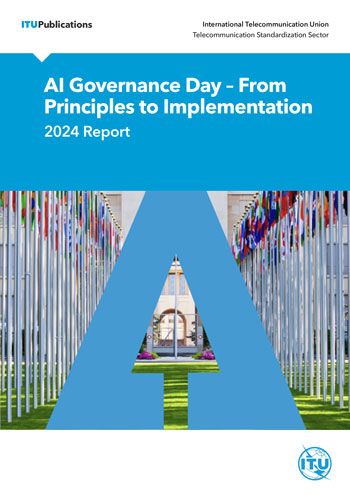
Key findings on the state of global AI Governance
By Reinhard Scholl, Programme Chair, AI for Good Global Summit 2024
At ITU’s AI for Good Global Summit, government leaders, policymakers, researchers, and technologists from both developed and developing countries came together at the first-ever “AI Governance Day – From Principles to Implementation” on 29 May 2024.
This United Nations (UN) event focused on moving from principles to practical AI governance frameworks. It brought diverse stakeholders together, reflecting ITU’s mission of fostering an inclusive and neutral platform for artificial intelligence (AI).
AI Governance Day report
A new report details the key insights and recommendations from the policy discussions, and aims to guide stakeholders in developing effective AI governance strategies.

While principles are essential, their abstract nature can hinder direct application, especially as AI technology evolves quickly. Regulatory bodies worldwide are increasingly codifying these principles into concrete regulations, creating a regulatory environment that affects AI development.
Multilateral and national initiatives
This AI Governance Day report includes a list of major multilateral and national initiatives as of the end of May 2024.
Notable examples include China’s Algorithm Registry introduced in December 2022, the United States’ Executive Order on AI issued in October 2023, and the European Union AI Act, set to take effect in 2024.
Towards effective AI governance
Amidst this regulatory evolution, a gap has emerged between regulation and the current state of technology and tools for monitoring and controlling AI systems. This gap poses significant risks and underscores the need for advancing tools to ensure effective AI governance.
AI Governance Day focused on how countries and regions can balance maximizing AI’s benefits while minimizing its risks. Participants shared experiences on effective practices, identified hurdles, and explored paths forward.
Most countries do not yet have AI legislation in place. Countries can leverage the UN system processes to support their AI governance efforts. The Inter-Agency Working Group on Artificial Intelligence, under the leadership of the United Nations Educational, Scientific and Cultural Organization (UNESCO) and the International Telecommunication Union (ITU), released a White Paper analysing the UN system’s institutional models, functions, and existing international normative frameworks applicable to global AI governance. The paper is offered as a UN system-wide contribution to relevant deliberations on the governance of AI. The paper was endorsed by the Chief Executive Board for Coordination (CEB) of the United Nations, comprising the Executive Heads of the United Nations.
AI and risk management
Many of the conversations centered around the need to maximize AI benefits while minimizing risks. The debates on AI safety and risk management emphasized the urgency of the task at hand, as the misuse of AI are keeping policymakers awake at night.
In the open-source vs. proprietary AI model debates, industry leaders debated the role of open-source models in fostering innovation and ensuring transparency while addressing governance risks.
The discussions and connections formed during AI Governance Day are expected to advance the journey from principles to implementation in AI governance.
The comprehensive report from AI Governance Day serves as a resource for advancing and understanding the complex terrain of AI governance and is available for download here.
Next year’s AI for Good Global Summit
Next year’s AI for Good Global Summit is scheduled in the week of 9-11 July 2025 in Geneva, Switzerland, and will devote a day to AI Governance.
